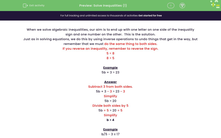When we solve algebraic inequalities, our aim is to end up with one letter on one side of the inequality sign and one number on the other. This is the solution.
Just as in solving equations, we do this by using inverse operations to undo things that get in the way, but remember that we must do the same thing to both sides.
If you reverse an inequality, remember to reverse the sign.
5 < 8
8 > 5
Example
5b + 3 > 23
Answer
Subtract 3 from both sides:
5b + 3 - 3 > 23 - 3
Simplify:
5b > 20
Divide both sides by 5:
5b ÷ 5 > 20 ÷ 5
Simplify:
b > 4
Example
b/5 - 3 ≤ 17
Answer
Add 3 to both sides:
b/5 - 3 + 3 ≤ 17 + 3
Simplify:
b/5 ≤ 20
Multiply both sides by 5:
b ÷ 5 x 5 ≤ 20 x 5
Simplify:
b ≤ 100
Example
Solve for a
5 - a ≥ 10
Answer
Add a to both sides:
5 - a + a ≥ 10 + a
Simplify:
5 ≥ 10 + a
Subtract 10 from both sides:
5 -10 ≥ 10 - 10 + a
Simplify:
-5 ≥ a
REVERSE and be careful to change the SIGN DIRECTION:
a ≤ -5
Does that all make sense?

Let's try some questions now. You can check back to these examples at any point by clicking on the red button at the side of the screen.







